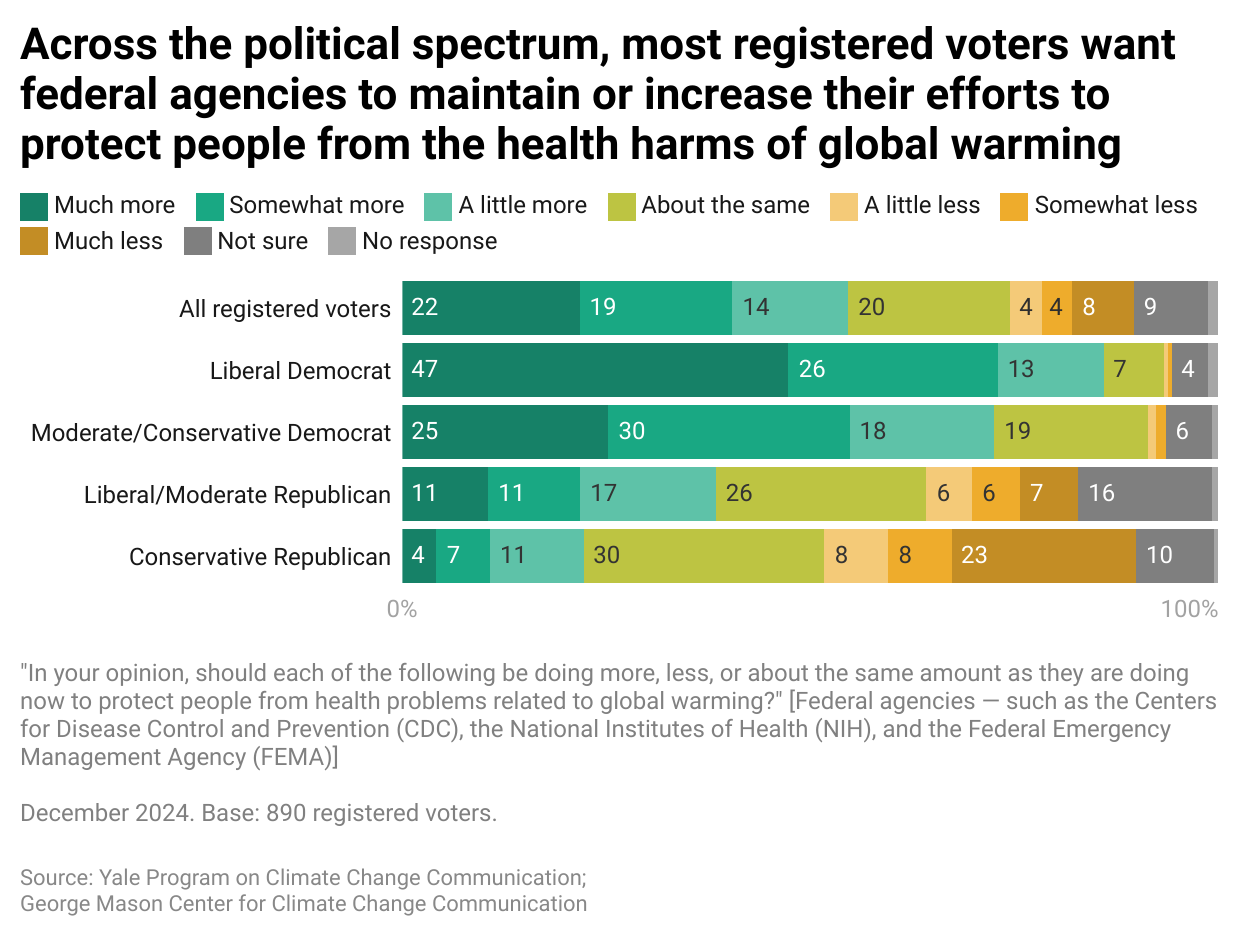Climate Note · May 15, 2025
A majority of registered voters want federal agencies to increase their efforts to protect people from the health harms of global warming
By Julia Fine, Yuan Yue, Joshua Ettinger, Eryn Campbell, Jennifer Carman, John Kotcher, Seth Rosenthal, Anthony Leiserowitz and Edward Maibach
Filed under: Policy & Politics
Many Americans understand that climate change harms health, and an increasing percentage believe climate-related health harms will become more common in their community over the next 10 years. Federal agencies such as the Centers for Disease Control and Prevention (CDC), the National Institutes of Health (NIH), and the Federal Emergency Management Agency (FEMA) have been working to limit and respond to these risks. Recently, the Trump Administration has cut funding and personnel from federal agencies’ climate and health programs.
In the latest Climate Change in the American Mind survey, conducted in December 2024 (after the presidential election, but before the Trump administration took office), we asked Americans how much federal agencies such as the CDC, the NIH, and FEMA should do to protect people from health problems related to global warming.
Key takeaways
- A majority of registered voters (55%) said federal agencies should do more than they are currently doing to protect people from the health harms of global warming.
- 20% of registered voters said agencies should continue to do the same amount, and 15% said they should decrease their efforts.
- Taken together, 75% of registered voters want federal agencies to maintain or increase their efforts to protect people from the health harms of global warming.
Overall, a majority of registered voters (55%) said federal agencies should increase their efforts to protect people from health problems related to global warming, outnumbering those who said federal agencies should decrease these efforts (15%) by more than 3 to 1. An additional 20% of registered voters said agencies should do about the same amount as they are doing now.
Support for federal agencies’ work on climate and health was highest among liberal Democrats, with 86% saying federal agencies should do more than they are, 7% saying they should do about the same amount, and 1% saying they should do less. Support was lowest among conservative Republicans, with 22% saying federal agencies should do more, 30% saying they should do the same amount, and 38% saying they should do less. Among moderate Republicans, 39% supported more federal action on climate and health, 26% supported the same level of action, and 19% called for less action.
Methods
The results of this report are based on Fall 2024 data from the Climate Change in the American Mind survey (n = 1,013) — a biannual, nationally representative survey of U.S. public opinion on climate change conducted by the Yale Program on Climate Change Communication and the George Mason University Center for Climate Change Communication. The data were collected from December 11 to 22, 2024, using the Ipsos KnowledgePanel®, a representative online panel of U.S. adults ages 18 or older. Respondents self-administered the questionnaires online in a web-based environment. Percentages are weighted to match national population parameters. Participants were asked: “In your opinion, should each of the following be doing more, less, or about the same amount as they are doing now to protect people from health problems related to global warming?” [Federal agencies — such as the Centers for Disease Control and Prevention (CDC), the National Institutes of Health (NIH), and the Federal Emergency Management Agency (FEMA)].”
Group differences were tested for statistical significance using the weighted proportions and unweighted sample sizes of each group. The average margin of error is +/- 3 percentage points for the subset of registered voters (n = 890). Average margins of error at the 95% confidence interval for the subgroups of voters are:
- Liberal Democrat +/- 7 percentage points (n = 230)
- Moderate/Conservative Democrat +/- 7 percentage points (n = 184)
- Liberal/Moderate Republican +/- 9 percentage points (n = 127)
- Conservative Republican +/- 6 percentage points (n = 244)
